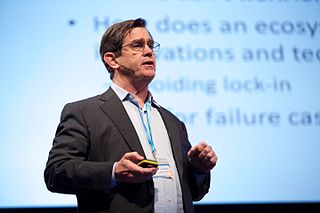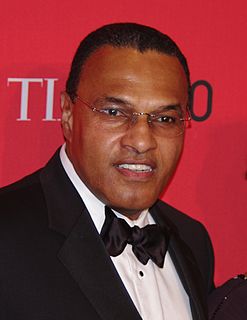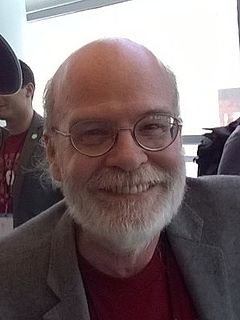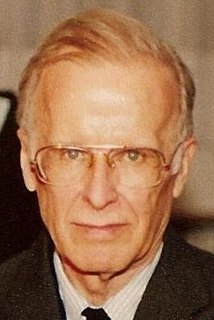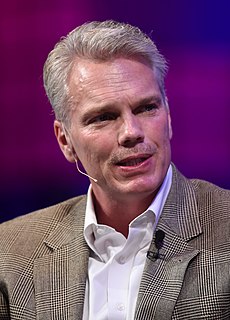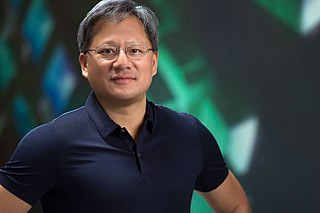Top 257 Computing Quotes & Sayings - Page 4
Explore popular Computing quotes.
Last updated on April 21, 2025.
If you think about computing, there isn't just one way to compute, just like there's not just one way to move around. You can have shoes, you can have a car, you can have a bicycle, submarine, rocket, plane, train, glider, whatever. Because you have one doesn't mean you get rid of another one... But PCs continue to be important.
Items of interest will be located, identified, monitored, and remotely controlled through technologies such as radio-frequency identification, sensor networks, tiny embedded servers, and energy harvesters - all connected to the next-generation internet using abundant, low-cost, and high-power computing.
[The] dynamics of computational artifacts extend beyond the interface narrowly defined, to relations of people with each other and to the place of computing in their ongoing activities. System design, it follows, must include not only the design of innovative technologies, but their artful integration with the rest of the social and material world.
The increasing presence of cloud computing and mobile smart phones is driving the digitization of everything across both consumer and enterprise domains. It is hard to imagine any area of human activity which is not being reengineered under this influence, either at present or in the very near future.
People constantly face problems they've never seen before, and they have to solve them somehow. So a million people come up with a million solutions that are just a little bit different. If computing is being done by fewer resources, there will be enormous security gains by pushing things into standard practices.
The best programs are written so that computing machines can perform them quickly and so that human beings can understand them clearly. A programmer is ideally an essayist who works with traditional aesthetic and literary forms as well as mathematical concepts, to communicate the way that an algorithm works and to convince a reader that the results will be correct.
These are the men who, without virtue, labour, or hazard, are growing rich, as their country is impoverished; they rejoice, when obstinacy or ambition adds another year to slaughter and devastation; and laugh, from their desks, at bravery and science, while they are adding figure to figure, and cipher to cipher, hoping for a new contract from a new armament, and computing the profits of a siege or tempest.
No one has a monopoly on knowledge the way that, say, IBM had in the 1960s in computing, or that Bell Labs had through the 1970s in communications. When useful knowledge exists in companies of all sizes and also in universities, non-profits and individual minds, it makes sense to orient your innovation efforts to accessing, building upon and integrating that external knowledge into useful products and services.
We couldn't build quantum computers unless the universe were quantum and computing. We can build such machines because the universe is storing and processing information in the quantum realm. When we build quantum computers, we're hijacking that underlying computation in order to make it do things we want: little and/or/not calculations. We're hacking into the universe.
By 2020, most home computers will have the computing power of a human brain. That doesn't mean that they are brains, but it means that in terms of raw processing, they can process bits as fast as a brain can. So the question is, how far behind that is the development of a machine that's as smart as we are?
Before 'Dilbert,' I tried to become a computer programmer. In the early days of computing, I bought this big, heavy, portable computer for my house. I spent two years nights and weekends trying to write games that I thought I would sell. Turns out I'm not that good a programmer, so that was two years that didn't work out.
The human brain became large by natural selection (who knows why, but presumably for good cause). Yet surely most "things" now done by our brains, and essential both to our cultures and to our very survival, are epiphenomena of the computing power of this machine, not genetically grounded Darwinian entities created specifically by natural selection for their current function.
Computing is not about computers any more. It is about living. Whatever big problem you can imagine, from world peace to the environment to hunger to poverty, the solution always includes education, ... We need to depend more on peer-to-peer and self-driven learning. The laptop is one important means of doing that.
I think the increased ubiquity of the internet and networked computing in general allowed me to have some tether no matter where I was geographically. I could log in to a computer from anywhere in the world and access the same information and the same people. It allowed me to transcend the physical differences.
If everybody would agree that their current reality is A reality, and that what we essentially share is our capacity for constructing a reality, then perhaps we could all agree on a meta-agreement for computing a reality that would mean survival and dignity for everyone on the planet, rather than each group being sold on a particular way of doing things.
Here is what the world looked like in 2000... there were no plug and play solutions for ecommerce/warehouse management and customer service that could scale... which means that we had to employ 40+ engineers. Cloud computing did not exist, which means that we had to have a server farm and several IT people to insure that the site did not go down.
Did Google know much about media? Or Amazon about commerce? Tesla about cars? SpaceX about rockets? EBay about classifieds? What did I know about computing when I started Sun Microsystems? We should celebrate these entrepreneurs, not pillory them for fighting entrenched incumbent industries that have political influence and money.
Microsoft and Dell have been building, implementing and operating massive cloud operations for years. Now we are extending our longstanding partnership to help usher in the new era of cloud computing, by giving customers and partners the ability to deploy the Windows Azure platform in their own datacenters.
I can see a day soon where you'll create your own college degree by taking the best online courses from the best professors from around the world - some computing from Stanford, some entrepreneurship from Wharton, some ethics from Brandeis, some literature from Edinburgh - paying only the nominal fee for the certificates of completion.
As devices continue to shrink and voice recognition and other kinds of alternative user-interfaces become more practical, it is going to change how we interact with computing devices. They may fade into the background and just be around, allowing us to talk to them just as we would some other trusted companion.
Cloud computing, smartphones, social media platforms, and Internet of Things devices have already transformed how we communicate, work, shop, and socialize. These technologies gather unprecedented data streams leading to formidable challenges around privacy, profiling, manipulation, and personal safety.
The Eee Pad Transformer Prime is a category-defining product. Powered by Tegra 3, it launches us into a new era of mobile computing, in which quad-core performance and super energy-efficiency provide capabilities never available before. With Transformer Prime, ASUS has once again led the industry into the next generation.
Considering that we live in an era of evolutionary everything---evolutionary biology, evolutionary medicine, evolutionary ecology, evolutionary psychology, evolutionary economics, evolutionary computing---it was surprising how rarely people thought in evolutionary terms. It was a human blind spot. We look at the world around us as a snapshot when it was really a movie, constantly changing.


















